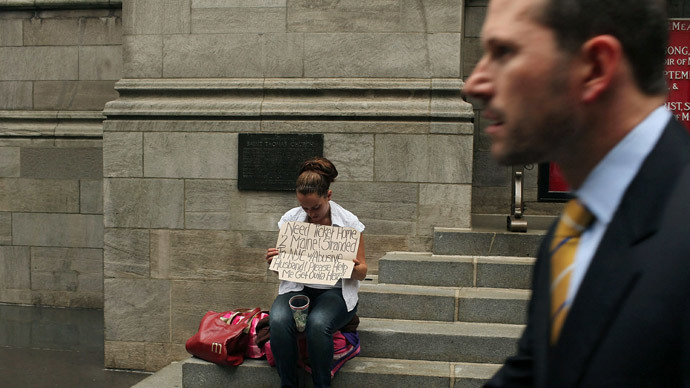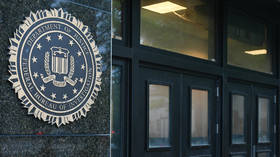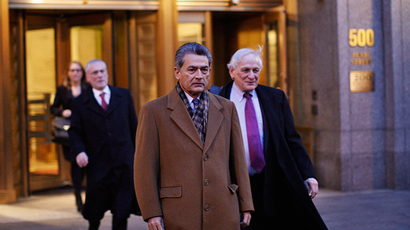US wealth gap widens since Great Recession - study

The wealth gap in the US has been widening since the Great Recession despite the 2008 financial crisis destroying billions of dollars in wealth. The recovery saw the richest restore much of their losses – unlike average Americans, researchers found.
The wealthiest 5 percent of Americans had 24 times the wealth of the average household in 2013, up significantly from 16.5 times as much in 2007, AP said, quoting a study by the University of Michigan.
A large part of the explanation for the yawning gap that now separates the rich from everybody else in America is the collapsed housing market, which is exactly what brought the global economy to the edge of the abyss in 2008.
In fact, fewer Americans can even afford to put a roof over their heads: The home ownership rate dropped to 64.8 percent in the first quarter of this year, from a high of 69.2 percent in 2004.
Tumbling from historic highs before the housing bubble burst, US home prices are still in the cellar. In the first quarter of this year, 18.8 percent of homeowners with a mortgage still owed more on their homes than they were worth, according to AP, citing real estate data provider Zillow.
Meanwhile, an additional 18.1 percent of Americans have so little expendable income that it wouldn't be enough to pay for the closing costs and down payment on a mortgage, Zillow added.

As for the wealthiest Americans, they have been reaping a windfall as the stock market has roared back from its recession lows. Not only has the market rebounded from 2008, it is setting new highs, according to the study. And since just 10 percent of American households own 80 percent of stocks, it is easy to see from where much of the disparity derives.
The study revealed that households at all economic levels suffered financial loss during the recession and that not even the top 5 percent have fully regained it. However, the higher up the financial pyramid one climbs, the greater the economic disparities grow.
Oxfam, in a separate study released in January, revealed that the gap between America’s rich and poor has grown at a faster pace than any other developed country. It demonstrated that the 1 percent, the rallying point of the Occupy Wall Street movement, captured 95 percent of post-recession growth (since 2009), while 90 percent of Americans suffered worsening economic conditions.
According to the University of Michigan study, many Americans may still feel poorer than before the financial crisis spoiled the spending party, and so may be curtailing their spending habits.
For the top 5 percent, net worth fell 16 percent from 2007, just before the recession began, through last year, while for average households it fell a whopping 43 percent.
The academic study takes a more downbeat look at US household wealth than do figures calculated by the Federal Reserve, which concluded that the country as a whole recovered all the wealth it lost by the first quarter of 2013.
READ MORE: Homeland Security monitored Occupy movement
However, the Fed report fails to provide data for households at different wealth levels, and its overall figures are bloated by massive financial gains among the richest Americans.
Fabian Pfeffer, assistant research professor at the University of Michigan, said the new study might have found less of an overall wealth recovery than the Federal Reserve did because the latter’s sample size did not capture the gains of the wealthiest 2 percent of Americans.













